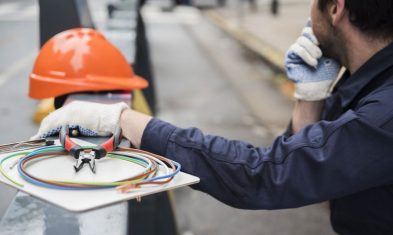Between starting a new business and juggling additional responsibilities, it’s easy to feel overloaded by all of the items needed in your electrical tool kit.
This ultimate manual will provide you with everything needed to:
- Add the best items to your electrical tool kit
- Discover recommended tools and brands from professionals
- Explore additional tools to make your job as effortless as possible
Use this complete electrical tool kit manual to save yourself from the hassle of wasting time and money on unnecessary items. Below, you’ll get an inside scoop into the most recommended electrical tools in the trade.
The Secret to Purchasing Essentials for Your Electrical Tool Kit
As a new start-up, you likely don’t have the budget to throw money at unnecessary, unreliable tools. Instead of buying everything at once, the secret to purchasing essentials for your electrical tool kit lies within starting out small.
Depending on the market you serve, it’s a good idea to start by offering a few main services. Then, when the budget allows for additional purchases, gradually expand service offerings.
Once you have defined which services to offer, this manual will uncover a detailed list of items needed to fill up your electrical tool kit.
The Best Electrical Tool Kits
You don’t necessarily need to buy the most expensive hand tools. However, buying a high-quality electrical tool kit goes a long way in protecting small hand tools as well as providing easy access to what you need.
Here are a few high-quality electrical tool kit options:
Tool Bag
Tool Belt
Tool Box and Storage
Tool Pouch
Tool Vest
Pickup Truck Toolbox
Complete Your Electrical Tool Kit With The Basics
Breaker Lockout/Tagout Pouch Kit
In order to comply with OSHA’s Lockout Standard, you must provide a breaker lockout/tagout pouch kit to lockout risky electrical devices. Use this handy pouch kit to secure electrical equipment, such as circuit breakers, electrical plugs, and wall switches.
Save employee lives, mitigate risk, and minimize insurance costs by supplying your electricians with proper lockout tools and warning devices.
Cutters
Aluminum Conduit Bender
When used with a long lever, an aluminum conduit bender bends angles in conduit, which is the tube where electrical wiring is run.
Cable Cutters
Since it’s more powerful than traditional pliers, cable cutters are used by electricians to cut large conductors and smaller cables. Although, these can only be used on copper or aluminum.
Diagonal Cutting Pliers
You’ll use diagonal cutting pliers for cutting and skinning wires, cutting and removing pins, nails and other fasteners.
- Channellock Diagonal Cutting Pliers
- DEWALT Diagonal Cutting Pliers
- Klein Tools Journeyman Diagonal Cutting Pliers
- Milwaukee Diagonal Cutting Pliers
Flashlight
In addition to needing lighting for inspections and searches for lost screws, you’ll also likely spend time working in attics and crawl spaces. It’s important to have a reliable flashlight to provide adequate light and safely complete the job. Plus, you can choose a flashlight with a magnetic pickup tool to easily pick up lost screws in tight spaces.
- Klein Tools Rechargeable Focus Flashlight With Laser – Handheld Flashlight
- Klein Tools Telescoping Magnetic LED Pickup Tool – Job Site Flashlight
Hacksaw
When using a metal blade, a hack saw can be used for cable armour, tray and strut.
Hex Keys
Since electricians use hex keys to tighten electrical termination lugs, it’s important to have a wide variety of sizes on hand. Hex keys tend to be rather inexpensive, so consider getting both standard and metric sizes.
Hole Saw Kit
Being an electrician, there will be countless times when you need to cut through walls. At times, you may need to run an EMT (i.e. electrical metallic tubing) through a wire or push through a teck cable, which requires drilling specific-sized holes to fit cleanly through the wall.
Multimeter
A multimeter (i.e. circuit analyzer) is a standard diagnostic tool electricians use to test voltage, current and resistance.
Depending on the job at hand, here are a few different electrical testing tools:
- Circuit analyzer: Ideal SureTest Circuit Analyzer
- Circuit and receptacle tester: Klein Tools GFCI Receptacle Tester
- Clamp meter: Klein Tool Digital Clamp Meter
- Digital multimeter: Klein Tools Auto-Ranging Digital Multimeter
- Fork meter: Milwaukee Fork Meter
- Non-contact voltage detector: Klein Tools Dual Range Non-Contact Voltage Tester
- Watt meter: Gardner Bender Energy Usage Power Meter
Pliers
Crimping Pliers
Your crimping pliers will be used to install butt splices and Sta-Kons
Linesman Pliers
Heavy duty linesman pliers are used to cut and twist wires. Otherwise known as the “Electrician’s Hammer,” it works great for cutting small gauge steel wire as well as many other electrical jobs you’ll encounter. When linesman pliers are properly taken care of, they can last for your entire career. For this reason, it’s important to spend the money on the best brand.
- DEWALT Compound Action Linesman Pliers
- Husky Linesman Pliers
- Klein Tools Journeyman Linesman Pliers
- Milwaukee Linesman Pliers Set
Needle-Nose Pliers
You’ll need needle-nose pliers for gripping in tight spaces. Look for pliers rougher at the ends for even easier gripping capability. Pick a few different styles to meet a wider variety of purposes. Also, like the ones we’ve recommended below, be sure to choose one that has a side cutter. This will save you from having to buy a separate side cutter.
Tongue-and-Groove Pliers
Insulated tongue-and-groove pliers are used by electricians to tighten conduits, conduit fittings, gang boxes and connectors. Choose a few different sizes to tackle the needs of any job.
Screwdriver Set
During the entirety of your career as an electrician, you’ll likely tighten thousands of screws. Choose a high-quality, long-lasting screwdriver set that’s less likely to strip screws.
Also, if you prefer to use just one tool, it’s recommended to have an all-in-one screwdriver and nut driver. Though it is heavy, you don’t have to carry as many tools with you.
Socket Set
Whether you need to remove or tighten nuts, bolts, or other fasteners, a great socket set has you covered.
Stripping Tools
Wire Strippers
Even apprentice electricians will need to use wire strippers on a daily basis. These are used for stripping the insulation from wires. Both wire strippers recommended below are important to add to your electrical tool kit. While many electricians prefer automatic wire strippers, there are situations where you’ll need a manual one.
-
-
- This tool is great for residential electricians.
-
Cable Stripping Tools
Electricians use cable stripping tools as a multi-purpose tool for opening boxes/packaging as well as stripping cable and insulation. Particularly with commercial accounts, check with customers to ensure they have no restrictions on knives. While razor knives and box cutters are sometimes banned, many companies allow electrician knives.
Wrench Set
Whether you don’t know a nut size, or you’re dealing with rare metric sizes, wrenches with a mid-range set of jaws are the way to go. Though, keep in mind, there are ratcheting wrenches, but they are not preferred by many electricians because of the extra hassle.
- Crescent Adjustable Wrench Set
- DEWALT Adjustable Wrench Set
- Husky Double-Speed Adjustable Wrench Set
- Milwaukee Adjustable Wrench Set
Stock Up on These Miscellaneous Tools
Carpenter Pencils and Markers
Whether you need to make marks for cutting, measuring, sawing, or anything else under the sun, a carpenter pencil and markers are a must-have essential. If you don’t want to leave a permanent mark on a surface, then Home Depot has a great, affordable option for carpenter pencils. Alternatively, Milwaukee INKZALLs or Pro Sharpies will also work.
Circuit Finders
A great circuit finder has the ability to quickly and precisely identify fuses and breakers, trace wires and pinpoint opens and shorts.
Electrical Tape
Electrical tape serves as an economical, general-purpose insulating tape with fantastic resistance to moisture, abrasion and corrosion. Electricians use it to insulate electrical wires, as well as other conduit electricity materials, and repair minor damage to wires.
The best way to choose the proper electrical tape is to pick the proper grade for what’s needed. For example, in cold conditions, you’d want to choose a cold weather electrical tape for the best adhesion.
As always, don’t use electrical tape as a wire nut replacement. Also, for the best moisture resistance, use self-bonding tape.
Electric Hammer Drill
In order to break through concrete and other hard surfaces, you’ll need an electric hammer drill.
- Bosch 20V Hammer Drill
- DEWALT 20V MAX XR Hammer Drill
- Makita 18V LXT Hammer Drill
- Milwaukee 18V Hammer Drill
- RIGID 18V Hammer Drill
Fishing Rods
Electricians use fishing rods (i.e. fish sticks, fish tape, etc.) for pulling wire through steel conduits to run through walls, ceilings or underground. This holds wire to connect to a circuit breaker panel. Spring steel fishing rods are among the most common due to its stiffness and ability to push greater lengths through a conduit.
- Klein Tools 50-ft Steel Fish Tape
- Milwaukee Steel Fish Tape: 25-ft or 100-ft
Hammer
Both residential and commercial electricians will need a simple hammer to attach wire staples and hammer in nails. However, if you’re an industrial electrician, this likely isn’t a priority.
Labeling Machine
Any busy electrician will need a labeling machine to organize hundreds of cables, electrical gear and more. Don’t be afraid to spend a little extra on a quality label maker. Remember, with cheaper label makers, the labels tend to fade over time.
Tape Measure
Whether you need to measure strut, conduit, tray, lumber, or anything else, a tape measure is an invaluable tool to add to your electrical tool kit.
- Stanley Tape Measure
- Lufkin Tape Measure
- Milwaukee Tape Measure
- DEWALT Tape Measure
- Tajima Tape Measure
Torpedo Level
A torpedo level works fantastically for measuring in small spaces. For the best ease of use, look for a torpedo level that’s magnetized.
- Empire Magnetic Billet Torpedo Level
- Klein Tools Rare Earth Magnet Torpedo Billet Level
- Milwaukee Magnetic Billet Torpedo Level
Supplemental Tools to Consider
Electrician’s Scissors
Primarily used for cutting thick-gauge wire, electrician’s scissors (i.e. electrician snips) can be a useful tool to add to your electrical tool kit.
- Klein Tools Free-Fall Snip Stainless Steel
- KNIPEX Electrician Scissor Snips
- Milwaukee Electrician Snips
Nut Drivers
If you need to tighten fasteners, bolts or nuts, a nut driver works well at tightening, securing or removing nuts.
Tin Snips
If you frequently work alone, then tin snips (i.e. aviation pliers, aviation clamps, aviation snips, tri-square, etc.) will be helpful as extra support.
Vise Grips
Electrician’s use vise grips (i.e. locking pliers, mole wrench, etc.) to quickly and easily clamp materials together, which is really helpful when working solo on projects.
Electrical Safety and PPE
Electrical safety and PPE (i.e. personal protection equipment) is essential in safeguarding you, your electricians and your business. Also, proper electrical safety and PPE is a legal obligation.
As always, consult with your local government’s laws to ensure all regulations, guidelines, procedures, certifications, licensing and any other legal requirements are met.
Additionally, it’s important to be familiar with OSHA’s standards for electrical safety. Plus, take a look at OSHA’s PPE guidelines as well their safety training guide and resources.
Take a look at a few other ways you can prioritize employee safety and minimize injuries:
- Purchase quality equipment
- Disinfect equipment on a regular basis
- Conduct routine equipment inspections
- Perform equipment maintenance as-needed
- Throw away equipment after exposure to harsh chemicals or toxins
Flame-Resistant Clothing
Electricians primarily use flame-resistant clothing to protect against flames and prevent thermal injury. Also, the insulation reduces the possibility of a second-degree burn. Plus, flame-resistant clothing resists ignition and self-extinguishes when the ignition source is removed.
Hard Hat
As a protection against electrical or object hazards and reduce high voltage exposure, electricians should wear OSHA-approved, hard hats. Ensure you purchase the right hat class and type based on your job sites needs/requirements.
Rubber-Insulating Gloves
Rubber-insulating gloves act as a first line of defense against energized components and electrical lines.
Safety Glasses and Shield
Drywall and sawdust are among the typical problems electricians face. For this reason, safety glasses (or goggles) and face shields protect the worker against flying fragments, objects, particles, sand, dirt and dust from harming the eyes or face.
Safety Shoes and Overshoes
In order to protect electricians from being grounded, they’ll need safety shoes and overshoes. Look for non-conductive steel-toe shoes. Also, in areas where the electrician might be exposed to electrical hazards, overshoe soles should be worn to act as a further barrier in preventing grounding.
Safety Vest
A reflective safety vest is used in high-traffic areas to ensure others see you when having to work in areas near vehicles or heavy machinery.
Ear Plugs
In order to block out hazardous noise levels, ear plugs are a must-have PPE essential for any electrician.
Arc Flash Hood
Used in the commercial space, an arc flash hood serves to protect an electrician’s head and neck from arc flash. Keep in mind, residential electricians won’t need an arc flash hood.
The Ultimate Secret Weapon to Have in Your Electrical Tool Kit
Among all of the tools mentioned, the ultimate secret weapon to have in your electrical tool kit is a reliable electrician service software. Surpass goals, grow faster, streamline everyday operations, optimize daily tasks and more.
Here’s how FieldEdge works around-the-clock for your electrician business:
- Effortless quoting in the field
- Track every step of every job
- Use the mobile app to take FieldEdge anywhere with you
- Establish long-term customers with next-level customer service
- Experience amenities like instant scheduling, dispatching service, lead management/CRM, invoicing and billing
Get your business started the right way by reducing workload and optimizing operations with FieldEdge.
Explore how the #1 electrician software has the power to transform your business into a success. Book a FREE personalized demo of FieldEdge today!
Complete Your Electrical Tool Kit With These Essentials
Leave out the guesswork and unending research and begin taking advantage of the items listed in this ultimate electrical tool kit manual today.
Using this ultimate electrical tool kit manual, you can now:
- Buy the necessary essentials
- Pick from the top brands in the industry
- Discover how the best electrician software can take your business to the next level
When you take advantage of the professionally-recommended items in this complete list, you’ll be well on your way to starting an electrical business that’s successful!




